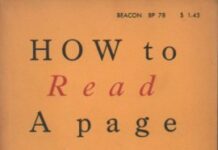
Ebook Info
- Published: 2003
- Number of pages: 294 pages
- Format: PDF
- File Size: 0.87 MB
- Authors: I.A. Richards
Description
Ivor Armstrong Richards was one of the founders of modern literary criticism. He enthused a generation of writers and readers and was an influential supporter of the young T.S. Eliot. Principles of Literary Criticism was the text that first established his reputation and pioneered the movement that became known as the ‘New Criticism’. Highly controversial when first published, Principles of Literary Criticism remains a work which no one with a serious interest in literature can afford to ignore.
User’s Reviews
Reviews from Amazon users which were colected at the time this book was published on the website:
⭐EXcellent.All aorund. Somewhat dated, but a serious deeply studied attempt to probe the impact of art and ow to assess its value.
⭐This book is an excellent read for any artist (literary, visual, peforming, or otherwise), particularly those who are just beginning as much of the material may seem less than revolutionary to the “educated” artist. Richards’ language is generally clear, and careful reading elucidates even the most convoluted of his passages. Overall an interesting book aside from a few chapters Richards spends chasing his own tail in an attempt to reconcile morality with desire.
⭐A book indicating a new direction for literary criticism, extremely useful for researchers. But you have to study Richards’ “Practical Criticism” too, to really understand the matter !
⭐In the years preceding the publication of Principles of Literary Criticism (1924), I. A. Richards was watching the very foundation of literature change or perhaps unravel right in front of his eyes. Authors such as Alfred North Whitehead, James Joyce, and T. S. Eliot had begun writing texts that represented enormous changes in style, tone, and content. Further, the audiences who were reading these texts were no longer composed of the elite scions of Edwardian society. In increasing numbers, middle class and even (horrors) working class blue collars began to seek the university degree that they felt sure would be a ticket to a more prosperous life. The problem with this growing mass of would-be-intellectuals was that they had to encounter and digest what to them was a bewildering and vastly confusing array of theories of learning that were heavily dependent on the aesthetically oriented Romantic vision of emotion and psychology that contemporary professors of literature insisted must be mastered prior to tackling the admitted complexities of the texts themselves. It was this required assimilation of subjective and pseudo-scientific notions that Richards was determined to overcome and eliminate.Richards also took to task the pedagogy that had been transplanted from Germany that required literature students to master history as a prerequisite to reading texts. According to this model if one wished to study Shylock’s motivation for his insistence on his pound of flesh from The Merchant of Venice, one first had to absorb the fullness of Jewish culture and anti-Semitism then prevalent in the Elizabethan age. Once one knew all that, then the play itself became quite secondary if not irrelevant. What Richards sought was a method that would focus solely on the words on the page with considerations of history, morality, psychology, and all other disciplines conveniently ignored. It seemed logical to Richards that a methodology of text over context was the only way to arrive at the “true” and universally accepted core meaning of a text.Alas, almost from the first day of publication, Principles of Literary Criticism caused a huge backlash from critics who were equally determined not to nudge a host of disciplines to the Dustbins of Unwanted and Unneeded Facts. These critics examined Richards’ use of terminology to divide all texts into three overarching categories: good, bad, and defective. A “good” text clearly presented its thesis. A “bad” text communicated something but whatever this “something” was it had no intrinsic value. A “defective” text also communicated something but this “something” may (or may not) have had intrinsic value. Richards’ critics jumped all over his overly vague use of subjective terminology like “good” or “bad” or “defective” in what to them was a pre-ordained failure to achieve objectivity using subjective words. Further muddying the linguistic waters was Richards’ unfortunate comment that only those who were of sound mental faculties could develop the requisite critical skills. Still, despite the ongoing brouhaha, Principles of Literary Criticism established the need to pay very close attention to reading skills that we now call “close reading.” One might argue, then, that the very defects of his theories made it possible for the next generation of theorists to tackle texts in such a way as to sweep aside the outmoded and quaint New Critical methods in favor of a myriad of now accepted means to tear texts apart.
⭐Routledge should be ashamed to have published such an important text with so many typographical errors. I’d say buy a used copy of the Harvest HBJ edition instead.
⭐I know this is a famous text and I am coming at it for the first time nearly forty years after my English degree. I feel the hands of Freud and Jung at work and that makes me switch off.
⭐Got this book delivered today. The paper binding is fine, but the pages are all disarranged like this. This is an almost 290 pages book, and it’s a pain to go through this.
⭐This is an excellent book for those, who want to know about Literary Criticism and literature
⭐Good
Keywords
Free Download Principles of Literary Criticism (Routledge Classics) 1st Edition in PDF format
Principles of Literary Criticism (Routledge Classics) 1st Edition PDF Free Download
Download Principles of Literary Criticism (Routledge Classics) 1st Edition 2003 PDF Free
Principles of Literary Criticism (Routledge Classics) 1st Edition 2003 PDF Free Download
Download Principles of Literary Criticism (Routledge Classics) 1st Edition PDF
Free Download Ebook Principles of Literary Criticism (Routledge Classics) 1st Edition

